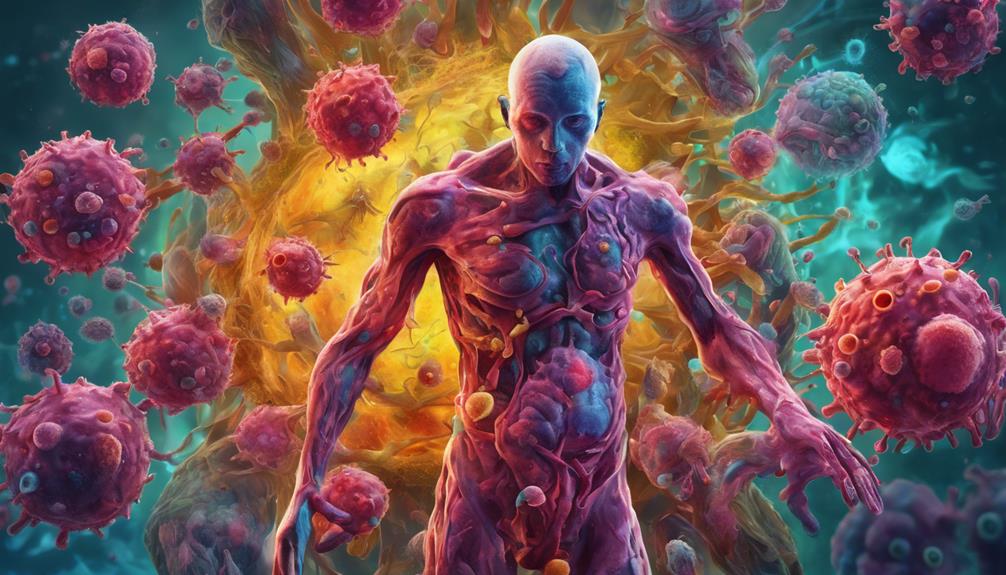The human body's ability to combat germs is a sophisticated and intricate process orchestrated by the immune system. From white blood cells diligently patrolling our bloodstream to antibodies tagging invaders for destruction, our defense mechanisms are finely tuned to protect us from harm. But what happens when this system falters or encounters a formidable foe? By exploring the complexities of how our bodies battle germs, we gain insight into the intricate dance between health and disease, shedding light on the remarkable resilience of our immune defenses.
Key Takeaways
- White blood cells, antibodies, and the complement system collaborate to defend against infections.
- Organs like the spleen, bone marrow, and thymus support immune function through cell production and activation.
- Memory cells, barriers like skin, and immune cells work together to recognize and eliminate germs.
- Immunization through vaccines trains the immune system to fight specific pathogens, aiding in disease prevention.
Understanding the Immune System
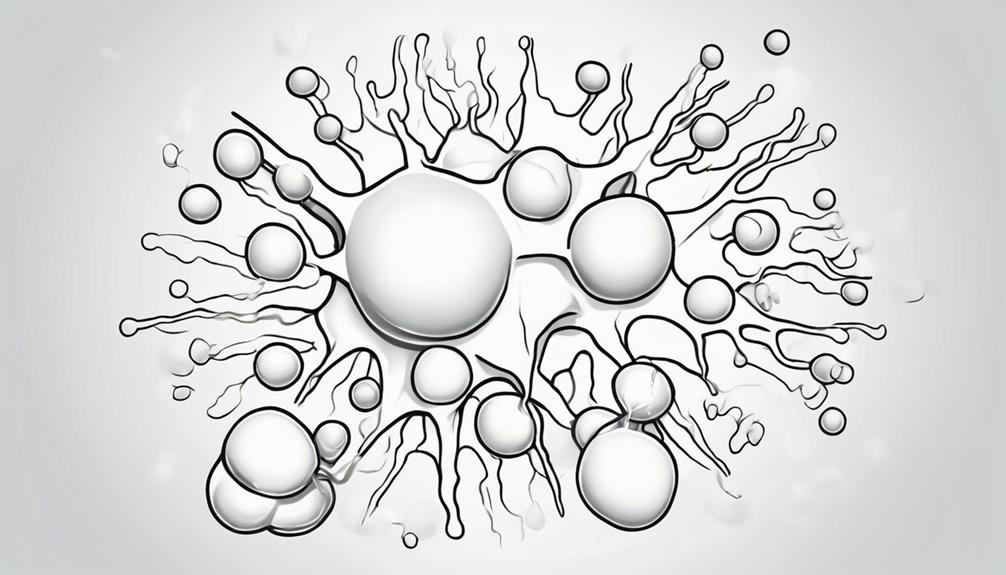
The immune system, a sophisticated network comprising organs, cells, and proteins, serves as the body's primary defense against germs and infections. When the body encounters germs, the immune system kicks into action through a coordinated series of events known as the immune response. This response involves various types of cells, such as macrophages, T cells, and B cells, which work together to identify and eliminate pathogens. Proteins like antibodies and complement proteins play crucial roles in tagging pathogens for destruction and enhancing the immune response.
In the presence of germs, the immune system's cells communicate through chemical signals to coordinate their efforts effectively. This communication ensures a targeted attack on the invading germs while minimizing damage to healthy tissues. The immune system's ability to distinguish between harmful germs and the body's cells is essential for maintaining health. Understanding how these cells and proteins interact during the immune response provides insight into the body's remarkable defense mechanisms against a wide range of pathogens.
Role of White Blood Cells
White blood cells, also known as leukocytes, are vital components of the immune system responsible for defending the body against infections. These specialized cells function by absorbing, destroying, or marking germs for destruction by the immune system. By developing memory of pathogens, white blood cells enhance the immune response for faster and more effective defense mechanisms.
White Blood Cell Function
Playing a crucial role in the body's defense against infections, white blood cells are produced in the bone marrow to combat a variety of pathogens. These specialized cells are key players in the immune system, identifying and neutralizing germs to maintain overall health. White blood cells produce antibodies, which act as markers that attach to germs, flagging them for elimination by other immune system components. Through a process of absorption or destruction, white blood cells effectively rid the body of harmful pathogens, preventing illness and promoting well-being. Furthermore, the immune system's ability to remember past encounters with germs enables white blood cells to mount quicker and more efficient responses upon subsequent exposures, enhancing the body's defense mechanisms.
Types of White Cells
Within the intricate network of the body's defense system, various types of white cells fulfill specialized functions essential for combatting infections and maintaining overall health. White blood cells, also known as immune cells, are produced in the bone marrow and contribute significantly to the immune response. These cells include neutrophils, monocytes, lymphocytes (T cells and B cells), eosinophils, and basophils. Each type of white blood cell plays a specific role in the immune system, such as engulfing pathogens, producing antibodies, or regulating the immune response. Antibodies, generated by B cells, bind to germs, marking them for destruction by other immune cells. This orchestrated effort by different white blood cells forms a robust defense mechanism that improves with repeated exposure to pathogens, enhancing the body's ability to fight infections efficiently.
| White Blood Cell Type | Function |
|---|---|
| Neutrophils | Engulf pathogens |
| Monocytes | Produce antibodies |
| Lymphocytes | Regulate immune response |
| Eosinophils | Combat parasites |
| Basophils | Release histamine |
Importance of Antibodies

Antibodies are crucial components of the immune system, playing a vital role in defending the body against harmful pathogens. By specifically targeting and marking germs for destruction, antibodies help prevent the spread of infections and aid in the recovery process. Their ability to recognize and remember past infections enables a more rapid and effective immune response upon subsequent encounters with the same pathogen.
Antibodies and Immunity
In the defense against pathogens, antibodies serve as vital components of the immune system's arsenal, recognizing and targeting specific antigens for eradication by immune cells. Produced by B lymphocytes, antibodies are key players in the specific immune response, binding to antigens on pathogens to facilitate their destruction. This targeted defense mechanism is essential for acquired immunity, offering protection against previously encountered pathogens. Memory B cells retain information about these specific pathogens, enabling a quicker and more effective immune response upon re-exposure. The diversity and specificity of antibodies are fundamental in the immune system's ability to adapt and provide defense against a wide array of infectious agents, highlighting their critical role in immunity.
Role in Defense
A critical aspect of immune defense against pathogens lies in the indispensable role played by antibodies, specialized proteins meticulously designed to recognize and neutralize specific infectious agents. Antibodies are crucial components of the immune response, binding to antigens on pathogens to mark them for destruction by other immune cells. This targeted defense mechanism enhances the body's ability to fight off infections effectively. Each type of antibody is uniquely shaped to recognize a specific antigen, ensuring a precise immune response. Following the initial exposure to a pathogen, the production of antibodies increases, leading to a faster and more robust immune response upon subsequent encounters. The table below summarizes key points about the importance of antibodies in the body's defense against pathogens.
| Key Points | Importance |
|---|---|
| Antibodies are specialized proteins | Essential for recognizing and neutralizing specific pathogens like bacteria and viruses. |
| Antibodies bind to antigens on pathogens | Marks them for destruction by other immune cells, aiding in the eradication of infections. |
| Antibodies play a crucial role in the immune response | Provide targeted defense, enhancing the body's ability to fight off invading pathogens. |
| Each antibody is uniquely shaped to recognize specific antigens | Ensures a precise and effective immune response against different types of pathogens. |
| Increased antibody production after initial exposure to a pathogen | Leads to a faster and more robust immune response upon future encounters with the same pathogen. |
The Complement System
The intricate network of proteins known as the complement system plays a crucial role in bolstering the immune system's defense mechanisms against pathogens. This system, comprised of various proteins, collaborates with antibodies and phagocytic cells to enhance the identification and clearance of invading pathogens such as bacteria and viruses. Upon activation, the complement system can generate membrane attack complexes that puncture cell membranes of pathogens, leading to their destruction. Moreover, it serves to modulate inflammation and immune responses by interacting with other components of the immune system. However, when the complement system is dysregulated, it can contribute to the development of autoimmune and inflammatory conditions. Understanding the intricate functioning of the complement system sheds light on how our immune system effectively combats microbial threats, highlighting the importance of this protein network in maintaining overall health and combating infections.
Function of the Lymphatic System
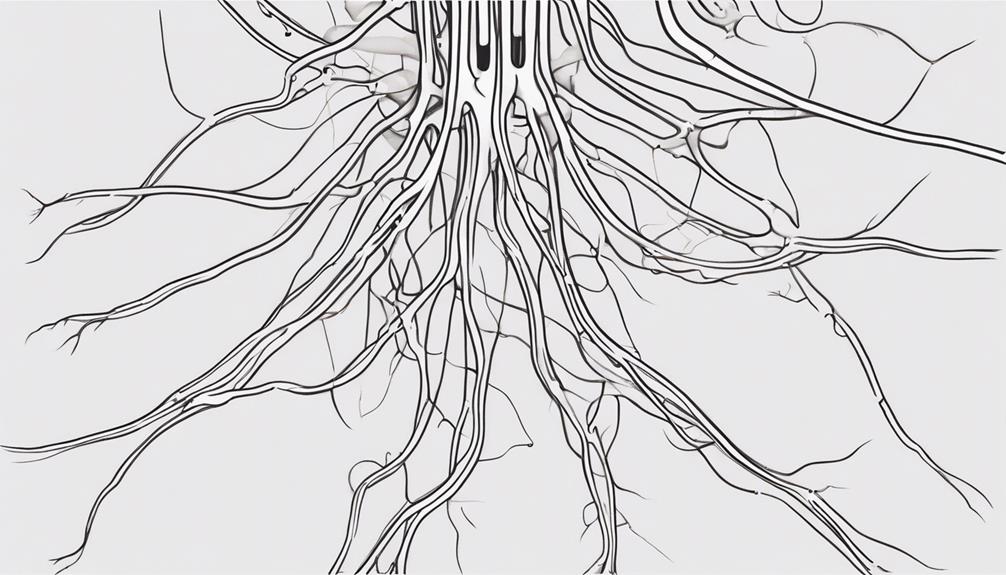
Amidst the intricate immune defense mechanisms orchestrated by proteins like the complement system, the lymphatic system emerges as a vital component in enabling immune surveillance and response through its circulation of white blood cells to combat infections. The lymphatic system, comprising a network of vessels and lymph nodes, serves as a transportation system for white blood cells, particularly lymphocytes, which are crucial in the immune response. Lymph nodes, strategically located throughout the body in areas such as the neck, groin, armpits, and under the chin, act as checkpoints where immune cells can encounter and eliminate pathogens. When the body is fighting an infection, lymph nodes may swell as they work to trap and destroy germs and abnormal cells. This process aids in preventing the spread of harmful substances. Overall, the lymphatic system plays a fundamental role in immune defense by facilitating the movement of immune cells and filtering out potentially harmful invaders, thus contributing to the body's ability to combat infections effectively.
Significance of the Spleen
Playing a pivotal role in the body's immune defense system, the spleen serves as a vital organ responsible for various essential functions. The significance of the spleen lies in its ability to contribute significantly to the immune response and overall health. Here are some key points highlighting the importance of the spleen:
- Acts as a blood filter, removing old or damaged red blood cells from circulation.
- Crucial role in immune response by producing white blood cells to fight infections.
- Stores platelets and helps regulate blood volume and red blood cell levels in the body.
- Contains specialized areas called white pulp where immune cells are activated to combat pathogens.
The white pulp within the spleen plays a critical role in coordinating immune responses by facilitating the activation and proliferation of white blood cells. Understanding the functions of the spleen sheds light on its essential role in maintaining a healthy immune system and overall well-being.
Role of Bone Marrow
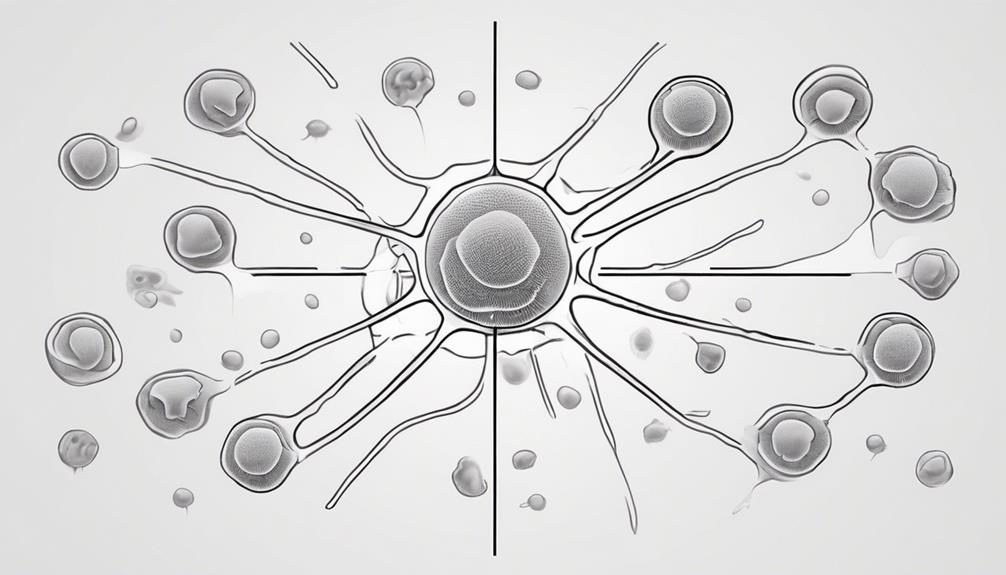
Bone marrow, a vital component of the immune system, serves as the primary site for the production of white blood cells essential for defending the body against germs. This spongy tissue houses stem cells that differentiate into various types of immune cells, including leukocytes crucial for combating infections. Understanding the role of bone marrow is fundamental in comprehending how our bodies combat germs effectively.
Blood Cell Production
Within the intricate system of the human body, the bone marrow plays a pivotal role in the production of various types of blood cells essential for immune defense.
- White blood cells, crucial for fighting infections, are generated in the bone marrow.
- Bone marrow contains stem cells that differentiate into different blood cell types to support immune function.
- The process of blood cell production in the bone marrow is called hematopoiesis.
- Healthy bone marrow function is essential for maintaining a robust immune system and fighting off germs effectively.
Immune Cell Development
Responsible for the development of crucial immune cells essential for combating infections, the bone marrow serves as a primary hub for the maturation of various white blood cell types. Within the bone marrow, stem cells undergo differentiation processes to give rise to a diverse array of immune cells, including B cells, T cells, and natural killer cells. These immature immune cells undergo maturation within the bone marrow environment, where they acquire specialized functions and surface markers necessary for immune responses. Once fully matured, these immune cells are released into the bloodstream, where they can effectively recognize and eliminate pathogens. The bone marrow's role in immune cell development is vital for maintaining a robust immune system capable of defending the body against harmful germs and infections.
Germs Defense Mechanism
How does the immune system's defense mechanism in fighting germs rely on the intricate processes within the bone marrow?
- Bone marrow produces essential white blood cells for combating germs.
- White blood cells from the bone marrow identify and eliminate invading pathogens.
- Continuous production of white blood cells in the bone marrow ensures a constant supply for immune defense.
- Different types of white blood cells originating from the bone marrow have specialized roles in fighting various germs.
The bone marrow's function in generating white blood cells is crucial for sustaining a robust immune response against infections. This process highlights the integral role of bone marrow in supporting the immune system's defense mechanism against harmful germs.
Function of the Thymus
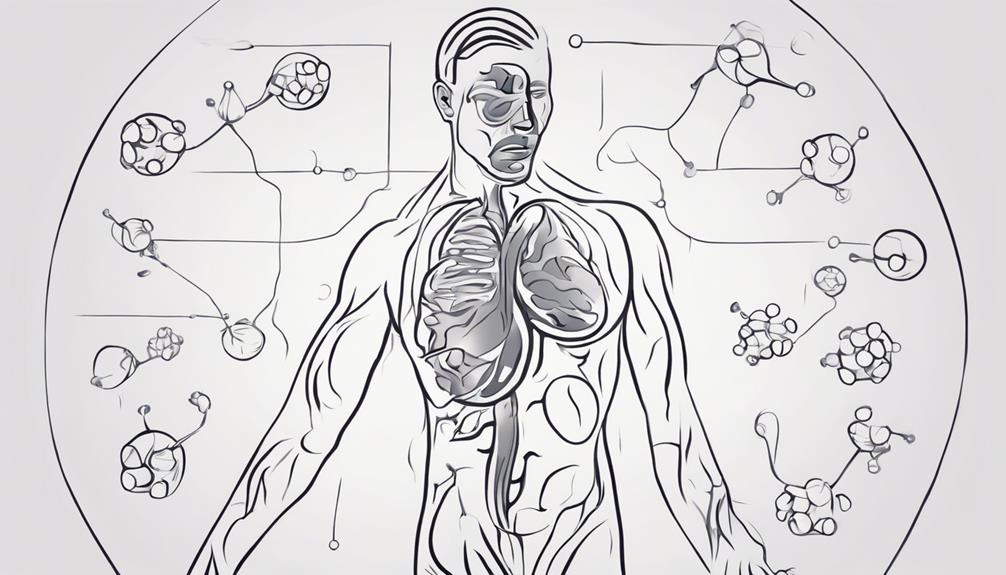
The thymus serves as a pivotal hub for the maturation and specialization of T-cells, fundamental components of the adaptive immune system. Situated in the chest, this primary lymphoid organ is essential for immune system development. Within the thymus, T-cells undergo a process of maturation and differentiation crucial for mounting effective immune responses. Specialized hormones like thymosin are produced by the thymus to support T-cell development and functionality. Educated within this organ, T-cells learn to distinguish between healthy and abnormal cells, enabling them to target and eliminate infected or compromised cells in the body. Any dysfunction in the thymus can result in immune system disorders, compromising the body's ability to combat infections efficiently. Therefore, the intricate processes that occur within the thymus are vital for ensuring a robust and effective immune response against pathogens, highlighting its significance in maintaining overall health and well-being.
Mechanisms of Fever Response
Upon encountering pathogens, the body initiates a natural response known as fever, elevating its temperature to combat infections effectively. Fever is triggered by the immune system in response to invading germs like bacteria or viruses. This essential response creates an unfavorable environment for germs to thrive, aiding in the body's defense mechanisms. Fever plays a crucial role in activating immune responses, enhancing white blood cell activity, and speeding up the body's recovery process. By raising the body's temperature, fever helps to inhibit the growth and spread of pathogens, assisting in the overall immune defense strategy. Monitoring fever is important, as persistent or high fevers may indicate more severe infections that require medical attention for proper management. Understanding the mechanisms of fever response sheds light on the sophisticated ways our bodies combat infections, highlighting the intricate interplay between the immune system, fever, and white blood cells.
Immune System Disorders
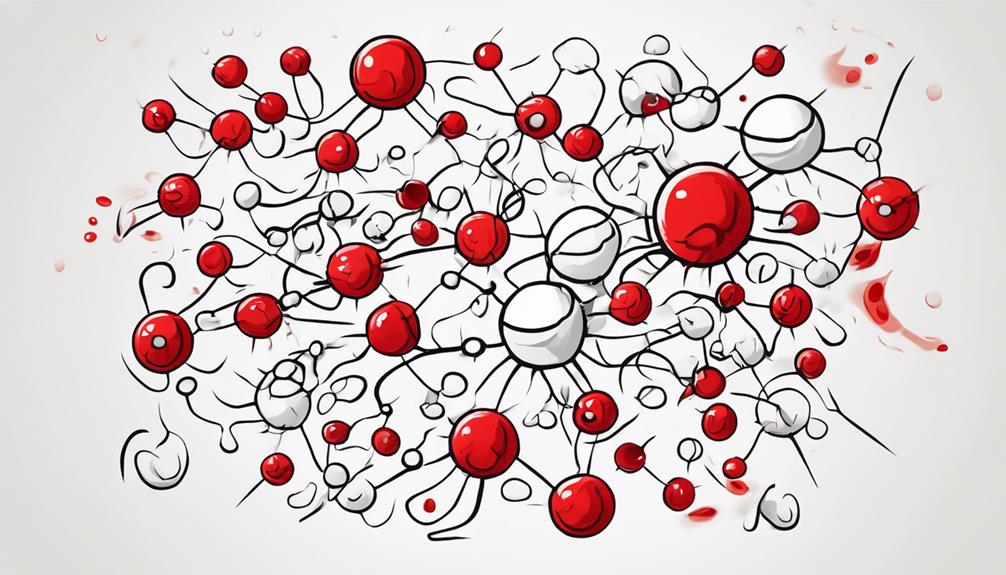
Following the discussion on mechanisms of fever response, the next focus lies on immune system disorders, which stem from abnormalities in the body's defense mechanisms against infections. Immune system disorders encompass a range of conditions that affect the functioning of the immune system, leading to issues in fighting off harmful pathogens. Examples of immune system disorders include allergies, immunodeficiencies, and autoimmune diseases. Allergies involve an exaggerated immune response to harmless substances like pollen or food, triggering symptoms such as sneezing, itching, or swelling. Immunodeficiencies weaken the body's ability to combat infections and diseases, making individuals more susceptible to illnesses. Autoimmune diseases arise when the immune system mistakenly attacks healthy cells and tissues, causing inflammation and damage. Understanding these immune system disorders is crucial for developing effective treatment strategies to manage these conditions.
| Immune System Disorders | |
|---|---|
| Allergies | Exaggerated immune response to harmless substances |
| Immunodeficiencies | Weakened ability to fight infections and diseases |
| Autoimmune Diseases | Immune system attacks healthy cells and tissues |
Importance of Immunization
Immunization plays a pivotal role in bolstering the body's defenses against infectious diseases by training the immune system to recognize and combat specific pathogens. Vaccines are a crucial tool in this process, helping the body develop immunity by exposing it to harmless forms of disease-causing agents. Here are some key points highlighting the importance of immunization:
- Vaccines Train the Immune System: Vaccines train the immune system to recognize and fight specific pathogens, preventing the onset of disease.
- Reduction of Infectious Diseases: Immunization programs have significantly reduced the incidence of serious infectious diseases like measles and polio.
- Herd Immunity: Vaccination not only protects individuals but also communities through herd immunity, reducing the overall spread of diseases.
- Adherence to Immunization Schedules: Adhering to recommended immunization schedules is crucial for maintaining both individual and public health.
Frequently Asked Questions
How Does Your Body Get Rid of Germs?
The body eliminates germs through a complex immune response involving white blood cells that engulf and destroy pathogens. Antibodies produced by these cells bind to germs, neutralizing them and aiding in their removal. Inflammation plays a crucial role in pathogen destruction, while cellular immunity regulates the immune system's response. This orchestrated process ensures the efficient elimination of viruses and other harmful invaders from the body.
What Is the Body's First Defense Against Germs?
The body's first defense against germs involves multiple physical barriers and mechanisms that prevent pathogens from entering and causing harm. Skin acts as a crucial barrier, while mucous membranes in the respiratory tract trap germs. Cilia in the respiratory system aid in expelling trapped germs. Additionally, stomach acid in the digestive tract plays a role in neutralizing ingested pathogens. These initial defenses are vital in protecting the body from germ invasion.
How Do You Fight Bacteria in Your Body?
To fight bacteria in the body, the immune response employs various antibacterial mechanisms. White blood cells like neutrophils and macrophages engulf bacteria, while antibodies from B cells tag them for destruction. Complement proteins can disrupt bacterial cell walls. The inflammatory response recruits more immune cells to combat infections. Antibiotics target specific bacterial functions to halt growth and eliminate pathogens from the body, aiding in microbial defense and pathogen elimination.
What Are Three Ways That Our Bodies Are Protected From Disease?
Our bodies are protected from disease through the immune system's intricate defense mechanisms. White blood cells, like phagocytes, actively seek and destroy harmful pathogens. Antibodies produced by the immune system specifically target and neutralize germs to prevent infections. The inflammatory response, accompanied by fever, helps combat invading pathogens. Vaccines play a crucial role in developing immunity against diseases, providing an additional layer of protection for our bodies.
Conclusion
In conclusion, the immune system plays a critical role in protecting our bodies from germs and infections. One interesting statistic is that the human body produces around 100 billion white blood cells each day to help fight off pathogens. Understanding the mechanisms of our immune system can help us appreciate the intricate ways in which our bodies defend against harmful invaders, highlighting the importance of maintaining a healthy immune system through proper nutrition, exercise, and hygiene practices.
